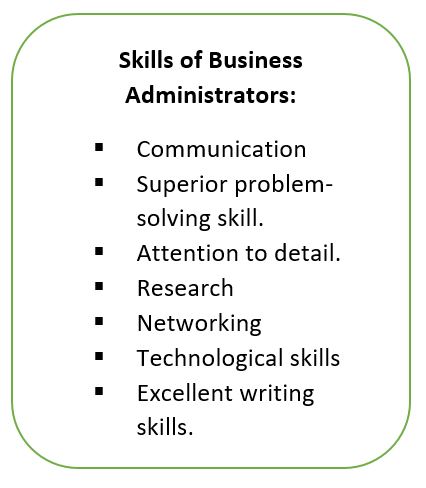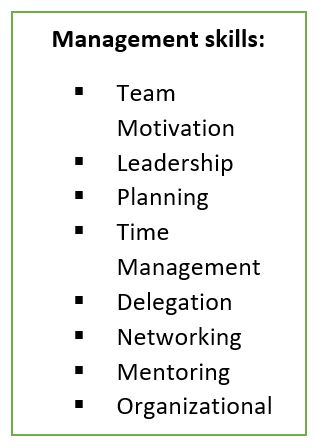
Position titles- such as Manager and Administrator - are important in business circles. They signify someone’s expertise and how influential they are in the company. In this article, I take a close look at the roles of a Manager and a Business Administrator in a company.
In this article, the use of Administrator relates to leaders in an organization that occupy senior executive functions.
Notwithstanding the fact that some companies do blend both roles under a single title, they are two distinct positions, with distinct responsibilities.
 And as a professional manager myself, I can corroborate what research has revealed in the past; that clearly distinguishing the professions of individuals has a positive impact on accountability and productivity.
And as a professional manager myself, I can corroborate what research has revealed in the past; that clearly distinguishing the professions of individuals has a positive impact on accountability and productivity.
Without further ado, let’s dive right in!
Administrators
Administrators handle high-level activities and key decisions concerning, for example, the company’s assets, business operations, policies, and strategies.
They then pass the decisions on to the Managers who ensure the teams efficiently execute the policies and strategies.
Duties of the Administrator include:
- Being responsible for the company’s finances. For instance, making decisions regarding major and minor financial investments on any project.
- Determining how funds are released and used.
- Instigating and ensuring the interests of the company are at the forefront in negotiating deals or business acquisitions.
- Overseeing company’s assets, business operations, and general administration.
- Making sure the business operates efficiently and productively by ensuring that the project goals are aligned with the company’s mission and vision statement.

- Devising mechanisms for how the company can stay on top of its game and remain relevant.
- Defining clearly what needs to be done and when it should be done. For example, they decide which policy a company should follow at a particular time, by analyzing the situation, researching the law, and observing the business environment.
Managers:
Managers implement the plans and policies already laid down by Administrators. In other words, they execute plans. Unlike Administrators who can take high-level decisions and implement policies in all areas, Managers are more action-oriented. They can make certain decisions but are limited in scope.
Furthermore,
- Managers focus on overseeing people and things; and the business in general.
- Unlike Administrators - who are more concerned with framing strategies and setting objectives - managers concentrate more on action and planning.
- Managers determine who does the job and how it will be done. For example, they select the most competent employees and draw up recommendations on how the tasks can be successfully completed.
- Managers prepare timetables or work schedules for their staff, and set project deadlines.
- Their mission is more centered around leadership; they guide their teams and bring visions and policies to actualization.
Leadership is the capacity to translate vision into reality.
 All things considered Managers and Administrators both play significant roles in a corporation’s success. They both work very closely with each other, however, and hence the mix-up about their duties.
All things considered Managers and Administrators both play significant roles in a corporation’s success. They both work very closely with each other, however, and hence the mix-up about their duties. Most importantly, it is worth noting that companies with clear-cut responsibilities for their personnel save costs, have higher productivity, have more accountability, and greater potential.
Most importantly, it is worth noting that companies with clear-cut responsibilities for their personnel save costs, have higher productivity, have more accountability, and greater potential.
Further reading:
5 bénéfices du management bienveillant par Francoise Baroffio
Sources:
Administrator Vs Manager Vs Director, Study.com
What Is Leadership? by Kevin Kruse, Forbes
Difference between Business Management and Business Administration, mgtblog
Difference Between Management and Administration, KeyDifferences.com
Image:
Canva
Training:
TRAINING MANAGEMENT LEADERSHIP Geneva, Zürich and Vaud


 And as a professional manager myself, I can corroborate what research has revealed in the past; that clearly distinguishing the professions of individuals has a positive impact on accountability and productivity.
And as a professional manager myself, I can corroborate what research has revealed in the past; that clearly distinguishing the professions of individuals has a positive impact on accountability and productivity.
 All things considered Managers and Administrators both play significant roles in a corporation’s success. They both work very closely with each other, however, and hence the mix-up about their duties.
All things considered Managers and Administrators both play significant roles in a corporation’s success. They both work very closely with each other, however, and hence the mix-up about their duties. Most importantly, it is worth noting that companies with clear-cut responsibilities for their personnel save costs, have higher productivity, have more accountability, and greater potential.
Most importantly, it is worth noting that companies with clear-cut responsibilities for their personnel save costs, have higher productivity, have more accountability, and greater potential.